How Memestocks Affected Investors’ Actions And Emotions
We surveyed 1,500 investors to examine “the rise of the day trader.”
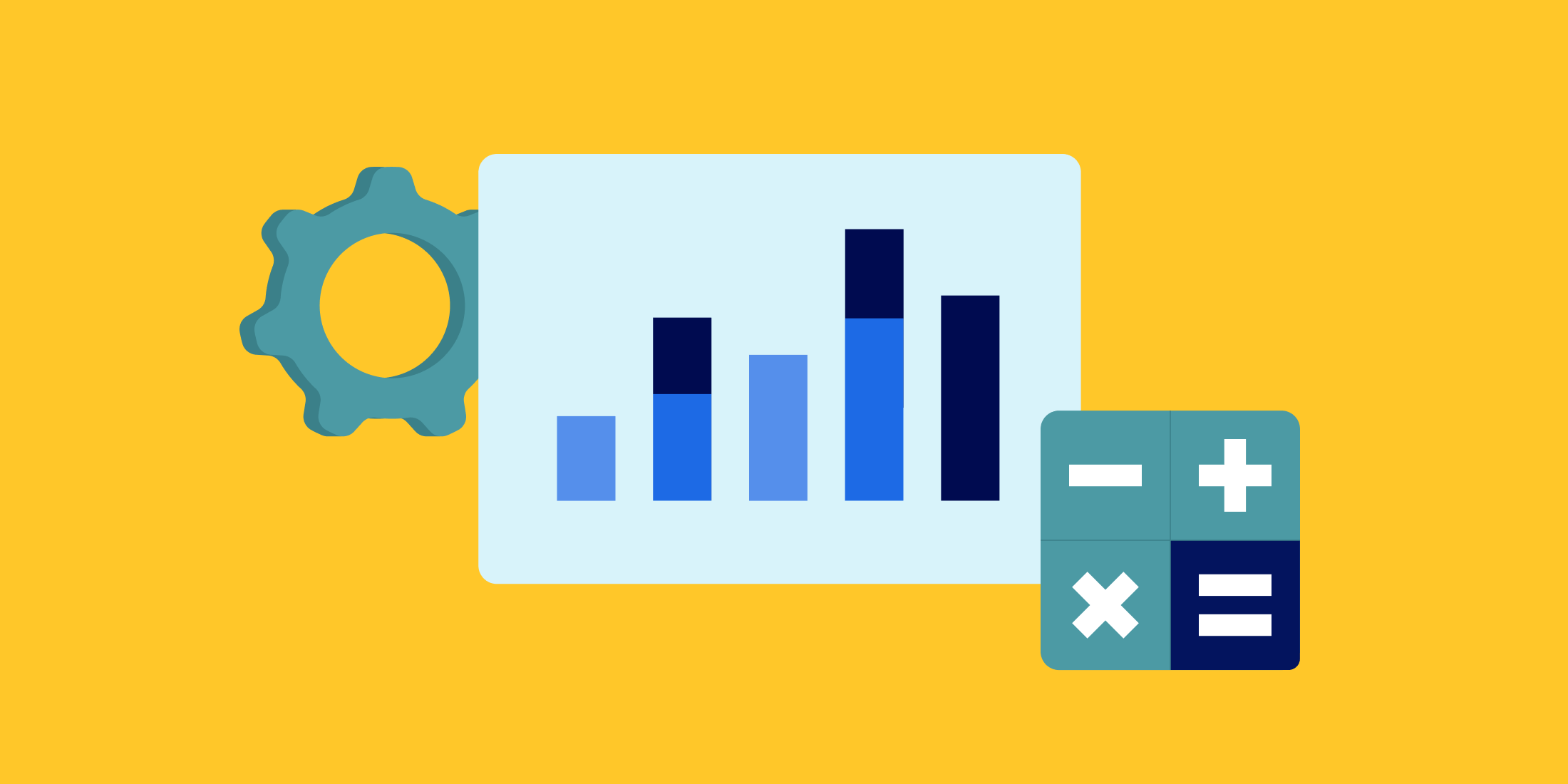
Money and emotions have long gone hand-in-hand, and this is no more apparent than during significant financial crises. From the 2008 market crash to COVID-19’s economic impact, we’ve seen first hand how money has the ability to impact our stress levels, mental health and personal relationships. And yet in times of particular financial strife—or likely because of it— many people take actions with their money that often undermine their emotional wellbeing, sacrificing long-term happiness for short-term pleasure without even realizing it at the time.
This trend toward short-termism grew in 2020: people stuck inside, on screens all day and kept from their normal activities sought new ways to fill their time and energy. Many took up day trading, culminating in one of the wildest rides at the beginning of 2021 (and recent surges demonstrating people are still trying to head to the moon) with Gamestop, AMC, Blackberry and other retail stocks caught in the middle of a clash between amateur retail and institutional investors.
Following this eventful start to the year, Betterment was curious to see both the immediate and long-term impact this had on investors, particularly those involved in the action. In this report -- a survey of 1,500 active investors conducted by a third party -- we took a look at the rise of day trading activity and the impact it did (or didn’t have) on people’s behavior. From their own forecasts, it looks like “the rise of the day trader” is here to stay -- but forecasting is hard. None of us would have bet on the pandemic and the changes it's causing. People actually aren't very good at forecasting their own preferences and behavior in the future, so it will be interesting to see if said forecasts actually come to fruition.
Regardless, at Betterment we welcome the addition of consumers looking to learn more about the markets and, ultimately, how to balance their portfolios for the long-term too.
Section 1: The Rise Of Day Trading Activity
With movie theaters, stadiums, bars and restaurants closed, many people took up day trading during the COVID-19 pandemic. Half of our total respondents said they actively day trade investments, and nearly half of those day-traders (49%) have been doing it for 2 years or less.
While most day traders indicated their main reason for doing so was that they believed they could make more money in a shorter period of time (58%), many (43%) also indicated it was because it is fun and entertaining. Of those who look to day trading for fun/entertainment, half (52%) said it was to make up for the bulk of their other hobbies—like sports, live music, social gatherings, gambling—not being available due to COVID-19.
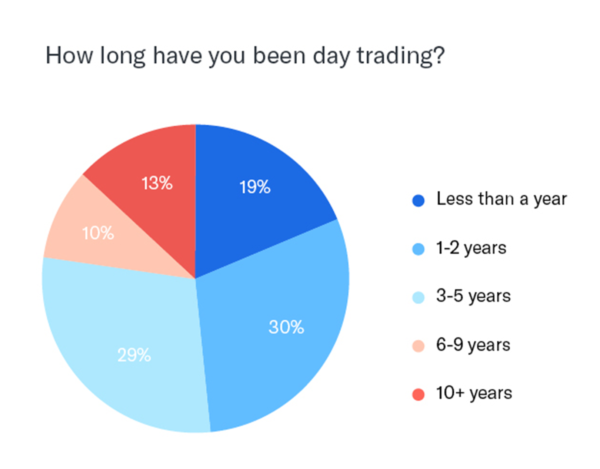
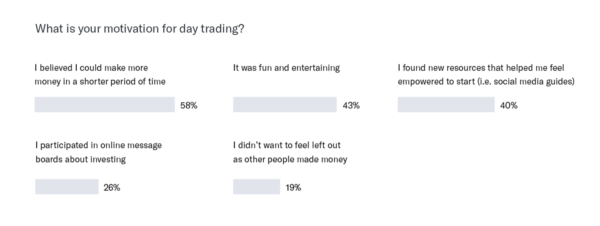
And these day traders have fully acknowledge that COVID-19 played a big impact role in their market activity overall: 54% indicated they trade more often as a result of COVID-19; and interestingly, 58% said they expect to day trade more as normal activities return and COVID-19 restrictions are lifted, likely as a result of what they learned during this downtime. Only 12% said they expect to trade less.


More than half (58%) are using less than 30% of their portfolio to actively trade individual securities or stocks. Nearly two thirds also allow an advisor (either online or in-person) to manage a separate part of their portfolio.
It's interesting to see more respondents expect to day trade more after the pandemic than are currently day trading: we imagine it is hard for people to forecast themselves into the future and imagine doing things differently than they are now. However, what is positive to see is these people aren’t using an excessive amount of their portfolio to day trade. The majority of investors day trade with a minority of their total investing balance, and delegate day-to-day management of the larger portion of their portfolio to an advisor.
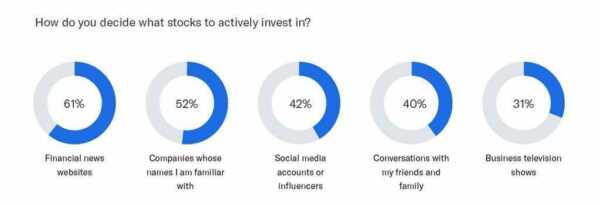
Passing hobby or not, how educated is the average day trader on what they’re buying and what they stand to gain—or lose? Sixty one percent rely on financial news websites to decide which stocks to buy, but nearly half (42%) are influenced by social media accounts, showing just how powerful “memestocks” can be.
More than half of the respondents suggested they buy stocks based on company names they’re familiar with, but we’ve seen this lead to issues in the past—with “ticker mis-matches,” where people trade the ticker of a stock that isn't the correct company. For example, after a tweet from Elon Musk about Signal (a non-profit messaging app), a different company’s stock was sent soaring 3,092%.
We also asked day trader respondents if they consider capital gains taxes when deciding to sell their investments. While the majority (60%) indicated that it influences them to hold onto stocks longer to avoid short-term capital gains, 14% said they weren’t aware there was a difference in taxes based on how long they hold a stock. Another 17% said they simply don’t care about the short-term capital gains tax.
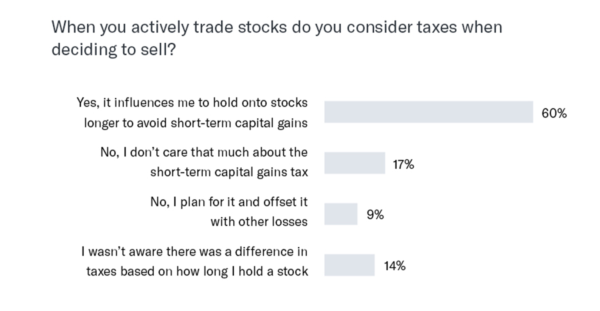
Who invested their stimmys?
Almost all (91%) respondents received some stimulus money, and nearly half (46%) invested some of that money; of those who did invest it, 70% invested half or less of their stimulus. Day trader and male respondents were more likely to invest then their counterparts, as represented in the graphic below.
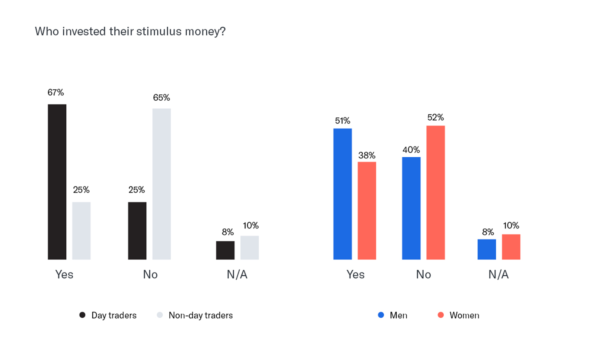
Section 2: Memestocks Understanding And Involvement
We asked all respondents how well they understood what occurred in the stock market in January & February surrounding “memestocks” like GameStop, AMC, BlackBerry and other retail investments.
Most indicated having some level of understanding, but nearly a quarter (24%) of all respondents said they didn’t understand it well at all; and only half (51%) of day trader respondents said they understood what happened very well.
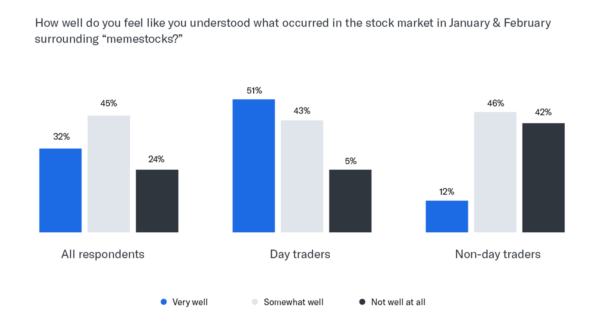
Nearly two-thirds (64%) of all survey respondents said they did not actively purchase any popular retail investments (GameStop, AMC, BlackBerry, etc.) during the stock market rally in January or February. But those that DID were primarily day traders.
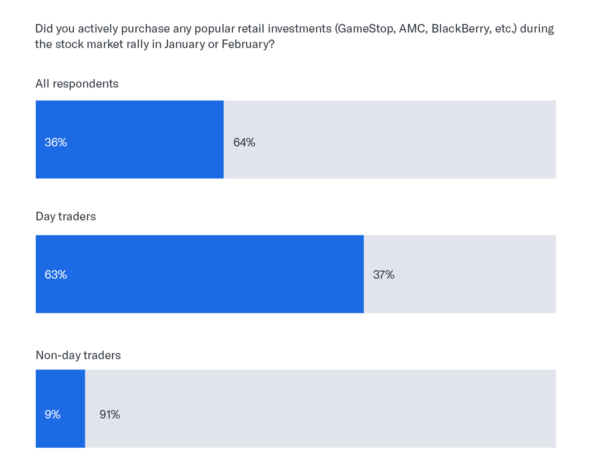
Of all respondents that did buy in actively, 55% are still holding onto all their investments. Only 2% of those that sold these investments sold everything at a loss; 44% sold all for a profit and 54% sold some at a profit and some at a loss.
Of those that bought into memestocks, there is a near universal consensus that they will continue investing in stocks like these that get a lot of attention in the future—97% said they’re at least somewhat likely to invest.
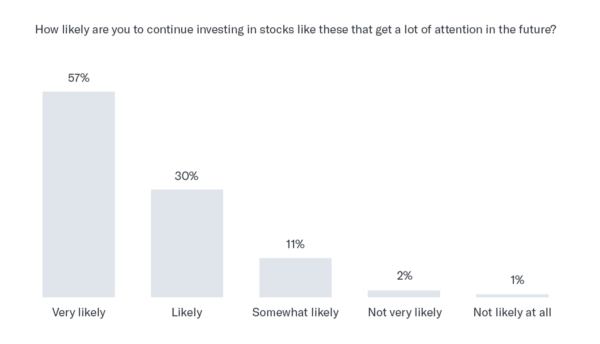
Betterment's Point Of View: It is interesting to see the majority of respondents holding onto their investments - are they expecting another high or holding on because they don't want to admit they made a bad investment? Disposition Effect says people tend to hold on until they get back to zero loss. However, 60% previously said thinking of short-term capital gains taxes encourages them to hold onto their investments longer.
Section 3: Money And Stress Factors
It’s no secret that money and stress are linked, so we wanted to take a look at respondents’ money habits and how that may be impacting stress levels. The consensus is that for better and for worse day traders and younger generations are more engaged with their finances.

We asked respondents how much they stress about their finances on a daily basis—three quarters said they stress to some degree. Interestingly, when we looked a layer deeper, day traders are much more stressed than non-day trader—86% indicated they stress to some degree, vs 65% of their counterparts.

In looking at the causes of the stress: respondents are nearly equally concerned about money in the short term, near term future, and long term future with the top 3 financial stress factors being their daily expenses (43%), how much money they will have in retirement (43%), and how much money they have saved (42%).
We asked respondents how often they are checking their bank account and investment portfolio balances - 39% are looking at their bank account balances every day, with 11% of those checking multiple times a day; 37% also check their investment portfolio balances every day, with 16% of those checking multiple times a day.
When we look a layer deeper, we find that day traders are checking both their bank account and investment portfolio balances significantly more than non-day traders.
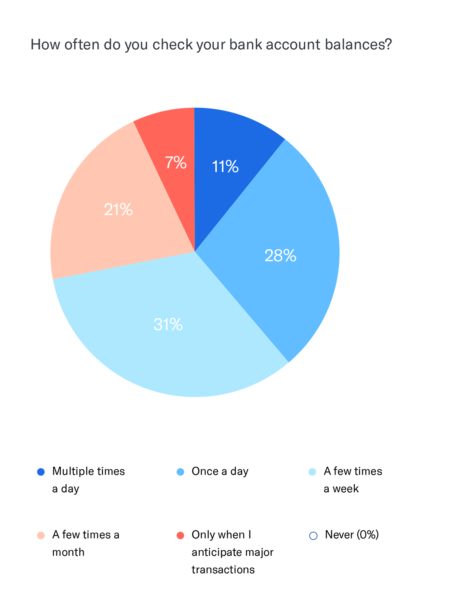
Interesting Bank Account Habits
- 50% of day traders indicated they check at least once a day (18% multiple times) vs 29% of non-daytraders (5% multiple times).
- Men check their accounts more often—41% at least once a day (13% multiple times) vs 36% of women (8% multiple times).
- 46% of Gen Z/Millennials and Gen X both said they check their accounts at least once a day, whereas only 28% of Boomers said the same.
- Those making more money actually check their accounts more often—42% of respondents making $100K or more check every day, compared to 39% of those making between $50-100K and 35% of those making less than $50K.
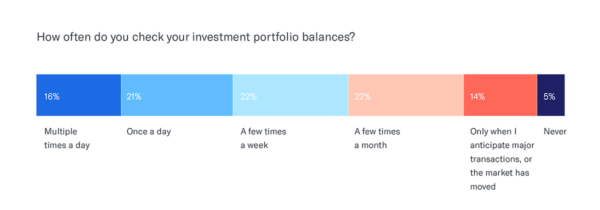
Interesting Investment Account Habits
- Unsurprisingly, 56% of day traders said they check their investment portfolio balances every day (25% multiple times a day), whereas only 18% of non-day traders said the same.
- 41% of men check every day, compared to 30% of women.
- 47% of Gen Z/Millennials check every day, compared to 41% of Gen X and 22% of Boomers.
- 42% of those making 100K or more check every day, compared to 35% making between $50-100K and 30% of those making less than $50K.
Encouragingly, when we asked people how they felt checking these accounts, the positive responses outweighed negative options for both. Interestingly, day traders were significantly more excited for both (21% for bank accounts, 25% for investments) than non-day traders (4% and 12%, respectively) as well.
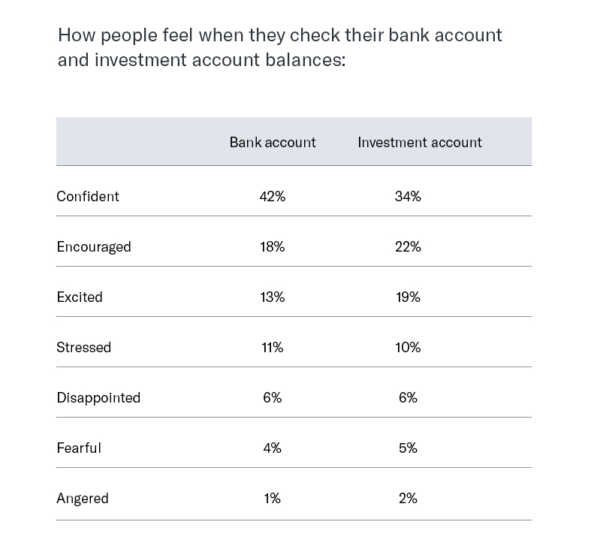

Most respondents (89%) indicated they’re putting some money away every month, but it's equally split as to where that money is actually going.

Conclusion
At Betterment, we have often compared day trading to going to Vegas—have a great time, enjoy yourself, but be prepared to come back home with fewer dollars in your wallet and a hangover. The trends outlined in this report seem to indicate that more people are dipping their toe into the investing pool and (so far) few have decided to walk away. Whether this trend will continue—and the long term impact it will have on people’s finances, health, stress, etc.—remains to be seen.
And for those who want to avoid the FOMO of the next big memestock, but aren’t sure of the best way to get started—a simple alternative is investing in a well-diversified portfolio. That way, whenever someone asks if you own the hottest thing, you can say “yes,” regardless of what it is.
Methodology
An online survey was conducted with a panel of potential respondents from April 26, 2021 to May 3, 2021. The survey was completed by a total of 1,500 respondents who are 18 years and older and have any kind of investment (excluded if only 401k). Of the 1,500 respondents, 750 of them actively day traded their investments while the other 750 did not. The sample was provided by Market Cube, a research panel company. All respondents were invited to take the survey via an email invitation. Panel respondents were incentivized to participate via the panel’s established points program, regardless of positive or negative feedback. Participants were not required to be Betterment clients to participate.
Findings and analysis are presented for informational purposes only and are not intended to be investment advice, nor is this indicative of client sentiment or experience.
Any links provided to other websites are offered as a matter of convenience and are not intended to imply that Betterment or its authors endorse, sponsor, promote, and/or are affiliated with the owners of or participants in those sites, unless stated otherwise.
